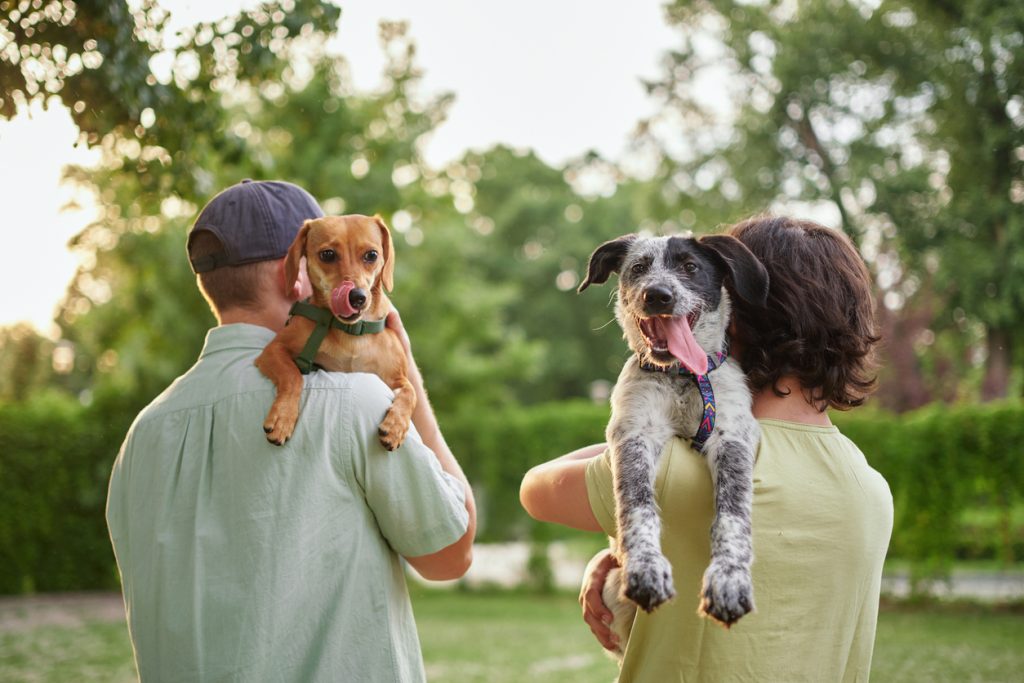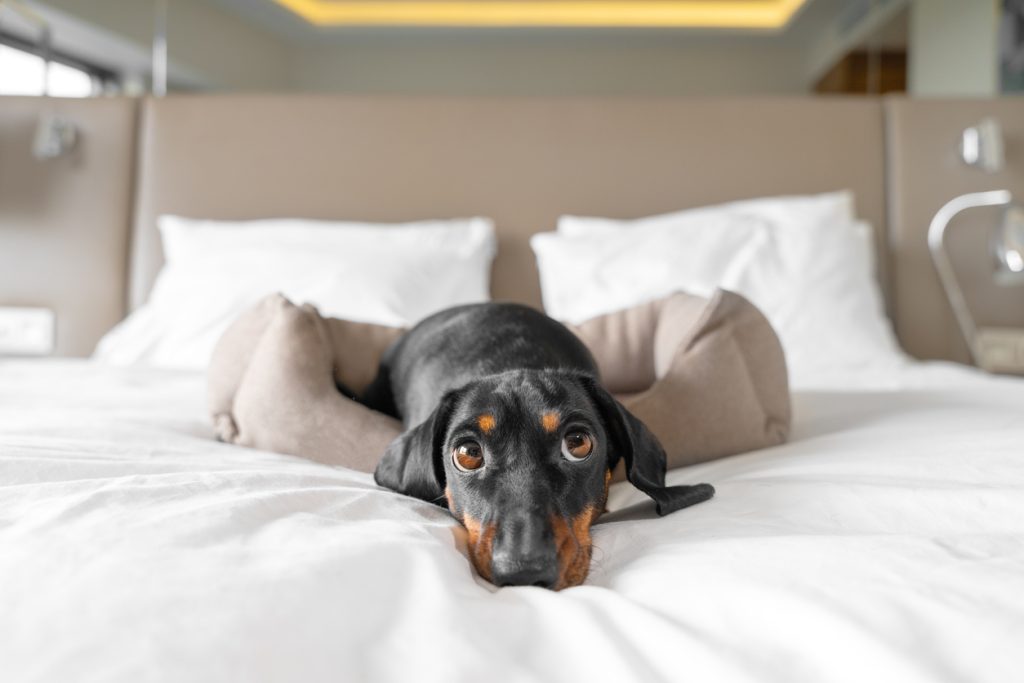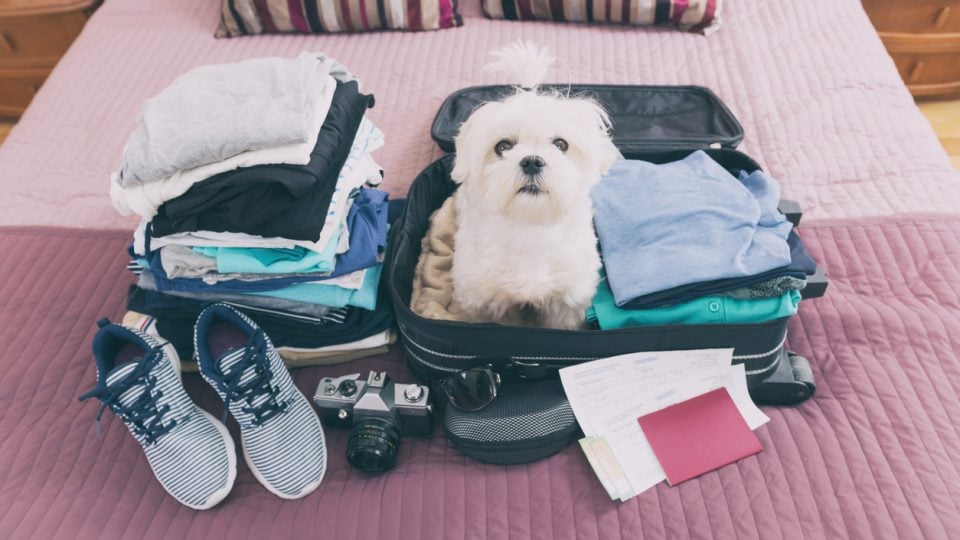Your flights are booked and your suitcase is ready to pack. It’s usually around this point that your dog starts looking at you sideways — are they coming on holiday too?
Leaving our dogs behind is one of the hardest parts of going away. But by planning their holiday as carefully as yours, it’s possible to head away with peace of mind, knowing your pup will have a great time while you’re gone.
It’s important to start thinking about your dog’s care in advance. But how do you choose the best option for your beloved companion?
Two of the most popular options are dog boarding — where your dog stays at a kennel or other professional facility, and house sitting — where a professional dog sitter stays with your dog at home. The costs for these can vary but expect to pay around £50-150 per night for boarding and £75-200 per night for house sitting.
We’ve rounded up all the information you need, from how to find the best option to a packing checklist and ways to prepare your dog.
Dog Boarding: The Options
When you’re making plans for your dog’s care while you’re away, there are several different options. Here are four of the most popular, plus the average costs for each. (Bear in mind that these may vary regionally).
Staying with friends and family

boytsov via iStock
Cost: From £0 and up, depending on what’s agreed.
This is the cheapest option and may cost you nothing if your friends and family love spending time with your dog! This can involve people staying at your home with your dog or your dog staying with them. It’s essential to agree on a few ground rules before you leave, including that they’ll stick to your dog’s usual routine and provide regular updates while you’re gone.
Staying in your own home
Cost: From £75-£250 per night.
If your dog is most comfortable in their own house, asking a dog sitter to come and stay in your home is a great option. You get all the advantages of professional care without worrying about your dog having to stay in kennels or interact with other dogs. This is typically the most expensive option, but it can offer the peace of mind you need for older dogs or those with complex care needs.
Staying at a dogsitter’s home
Cost: From £50-£200 per night.
If your dog loves doggy daycare and is comfortable interacting with other dogs, staying at a dogsitter’s home can be a great choice. This way, your dog still gets the benefits of a home environment and plenty of interaction with other dogs and humans, but you don’t need to worry about preparing your home for guests.
Staying in kennels or a pet hotel

Ирина Мещерякова via iStock
Cost: From £50-£200 per night.
Kennel accommodation ranges from basic pens for each dog, with space for them to sleep and eat, to spacious pet hotels with plenty of interaction and entertainment. If you’re considering this option, vet surgeon Dr Alex Crow recommended touring any facilities you’re considering using. “Check for cleanliness, space for dogs, qualified staff, enrichment activities, webcam access, and overnight staffing,” he said.
Finding the Right Fit
Choosing the right fit for your dog will give you peace of mind before you leave, and part of this process involves finding out how your dog will be cared for. Here are some suggested questions to ask:
- How many dogs do you watch at any one time?
- What protocols do you have if dogs are scared or anxious?
- Are dogs fed separately at meal times?
- How long will my dog be left alone?
- How frequently do you send updates on my dog’s progress, and do these updates include photos?
- How will you make sure my dog is mentally and physically stimulated?
- How many walks do dogs get daily, and how long do these last?
- Do you add your contact information to my dog’s collar, in case it’s needed?
- Do you have experience with specific issues, like separation anxiety or reactivity?
It’s also important to set aside time for meet-and-greets, so your dog can become familiar with the people looking after them.
Getting Ready: What to Do Before You Leave
Taking the time to prepare everything in advance will give you peace of mind while you’re away. Here are the four things you need to cover.
1. Create an information document
“Pet parents should provide the dog’s full medical history, veterinarian contact information, and permission for emergency medical decisions,” said Dr. Crow. Your chosen boarding facility or dog sitter may have a form they’ll ask you to complete with all the information they need. Examples of the kind of detail needed include:
- Vaccination records
- Any behaviour issues
- Medication dosages and timings
- Type of lead, harness, and walking style
- Your travel details, including flight numbers and timezone
- Details of your dog’s personality and play style
- Your dog’s routine, including feeding, exercise, and sleeping
- Whether your dog is allowed supervised free time with other dogs
- Details of command words for recall, wait, sit, and other commands
- Anything else you’d like to include
2. Complete a meet-and-greet session
Before you confirm any booking for your dog’s stay, ask for a meet-and-greet session. This can help ensure your dog feels comfortable with the people who’ll be looking after them while you’re away and give you a chance to address any potential issues.
Sometimes dog sitters will request a day session before booking overnight stays, or they might pop over for an hour to meet you and your dog.
3. Pack your dog’s belongings
If your dog is staying away from home, make sure they’ve got everything they need. If they’re staying at home with a dog sitter, check that everything is easy to find.
Here’s our suggested checklist to get you started:
- Collar with up-to-date contact information
- Harness and lead
- GPS collar (if used)
- Food and water bowls
- Blankets and bedding
- Food and treats
- A piece of clothing with your scent on
When it comes to toys, it’s best to check these won’t be used during group play sessions, as this may trigger resource guarding in some dogs. If your dog will be staying on their own or will have some solo playtime — then pack some toys too!
4. State your expectations
There’s nothing worse than being away from home and worrying about your dog’s care and welfare. By clearly stating your expectations beforehand, you can make sure you and whoever will be looking after your dog are on the same page. Things to think about include how many updates you’ll receive per day and whether a dog sitter staying in your house needs to clean or carry out any other duties.
How to Prepare for Potential Issues
Most of the time, your dog’s holiday will go smoothly and they’ll come home just as happy as before! But part of being a responsible pet parent is proactively thinking about how to approach any issues that might come up while you’re away.
In addition to the basic details within your dog’s information document, Dr Crow also recommended providing anything else you can think of that might be relevant to whoever is caring for your dog. This could include “specifics on your dog’s personality, anxiety triggers, dietary needs, favourite toys or activities, and more.”
It’s also important to have a backup — because we all know that emergencies can happen. Whether your friend is sick and can’t look after your dog as planned or you get a funny feeling when dropping your dog off at the kennels, you might need a last-minute alternative.
If your dog suffers from separation anxiety, you may also need to spend more time preparing for their trip. “For dogs with separation anxiety, pet parents can practice short-stay test runs,” suggested Dr. Crow.
He also recommended providing familiar items from home, confirming exact pickup/drop-off logistics, and maintaining your dog’s typical walking and feeding routine as much as possible. You can also ask your vet about calming supplements if needed.
What to do When You Get Home
Reuniting with your pup is one of the best things about coming home — and it certainly helps to dispel those post-holiday blues!
Even though you might want to rush home to snuggle with your dog, it’s worth making time for a short debrief with your dog sitter or boarder. Ask if there’s anything you need to be aware of, for example, a disrupted sleep pattern, decreased appetite, or any other changes. These issues can often be resolved once you and your dog are back together, but it’s good to know what to look out for.
Give your dog a quick once-over for any signs of pain or small injuries, including checking their paws. If you’re concerned that your dog isn’t acting normal or you notice dramatic changes like weight loss or anxiety, don’t hesitate to book a vet appointment.
Sometimes, it’s just not possible to bring our dogs with us when we travel. But by taking the time to arrange their holidays, you can make sure you’re both prepared. Plus, you’ll have peace of mind knowing your dog is getting the best care while you’re away.


